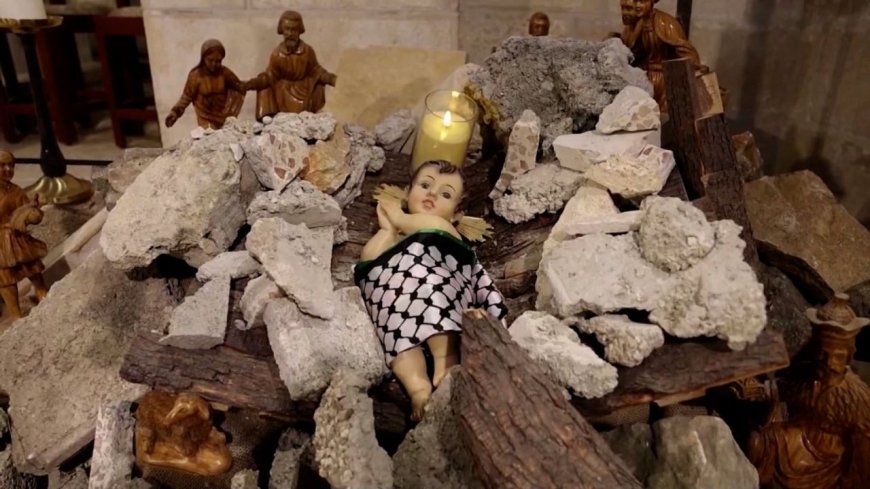Gaza: A Reflection of Western Civilization's Moral Deficit
The recent Gaza crisis has shown the West's shortcomings in religion, foreign diplomacy, and government, shedding a harsh light on the moral and identity foundations of Western culture. Beyond being a catastrophe for the Palestinian people, this conflict also served as a moral compass for the West, with disastrous consequences.

The recent Gaza crisis has shown the West's shortcomings in religion, foreign diplomacy, and government, shedding a harsh light on the moral and identity foundations of Western culture. Beyond being a catastrophe for the Palestinian people, this conflict also served as a moral compass for the West, with disastrous consequences.
In a world plagued by migration, conflict, and poverty, Ayatollah Khamenei's moving comment—in which he imagines Jesus Christ resisting the dominance of global powers—resonates deeply. It is not an extreme viewpoint but a sobering fact that Christianity, which was once a lighthouse of justice and kindness, has strayed far from its original principles. The West and its Christian institutions had a chance to demonstrate their ideals during the Gaza conflict. In its place, it exposed a morally bankrupt individual who lacked the integrity to face such massive wrongs head-on.
Despite its longstanding veneration as Christianity's spiritual core, the Vatican has recently been criticized for doing nothing amid a humanitarian catastrophe that ranks among the worst in history. According to an article published in the Iranian daily Resalat headlined "Christ, the Son of Palestine," the author raises the question of how the Vatican can assert its moral authority while keeping quiet about the devastation of Bethlehem, the site of Christ's birth, and the wider crimes in Gaza.
This criticism gets to the core of the problem with Western Christians' sense of who they are. During a struggle that led to the destruction of towns, ecosystems, and cultural heritage, how can a religion that preaches love and peace be ignored? A symbol of Christianity's origins, the Church of the Nativity is under siege, and its spiritual leaders are doing nothing to stop it. The Vatican and other international organizations were caught red-handed when they were unable or unwilling to use their power to defend justice in the Gaza Strip.
The wider inability of Western-led international organizations, like the UN, to adhere to their declared values was also brought to light by the Gaza crisis. In the face of flagrant violence and suffering, these institutions, which were meant to uphold world peace and security, were rendered powerless. The United Nations is the purported political arm of the global community, but if it cannot take bold action, then who will? The institutional inertia is emphasized by the fact that the Vatican did not speak out, which would have united Christians in opposition to these crimes.
The Western world takes great pleasure in its Enlightenment ideas and humanitarian beliefs, yet ironically, it has permitted these values to decay. Even if secularism and reason were advanced by the Renaissance and Modernism, they also helped to further separate institutional Christianity from Christ's teachings. Many Christians nowadays believe that the Church has been divorced from the core of Jesus' mission, which was to stand in opposition against oppression and to have compassion on the downtrodden.
A clear illustration of the West's selective anger is the situation in Gaza. Western nations talk a good game about human rights, but their silence or involvement in the methodical genocide in Palestine says it all. The destruction of a people, their heritage, and their prospects is at the heart of the conflict in Gaza, which transcends mere territorial issues. Palestine is becoming a site of unimaginable anguish as a result of Zionist colonization and military aggression.
There must be more than just empty platitudes said in reaction to this unrelenting tragedy. It demands an accounting from Western institutions, especially from its political and religious elites. Christianity must address the moral vacuum that its silence has revealed if it wants to recover its reputation as a religion that promotes peace and justice.
The crucifixion of Gaza today symbolizes the anguish that Christ endured. The moment to take action has come for Christians who have faith in the power of faith to change lives. Standing alongside the downtrodden and demanding justice from the oppressors is a holy way to honor the teachings of Jesus, the Son of Mary. The Western world can't afford to be complacent any longer; its moral survival depends on paying attention to the plight of those it has chosen to neglect.
Palestine isn't the only side being tested in Gaza; humanity as a whole is, and the West isn't measuring up.













































